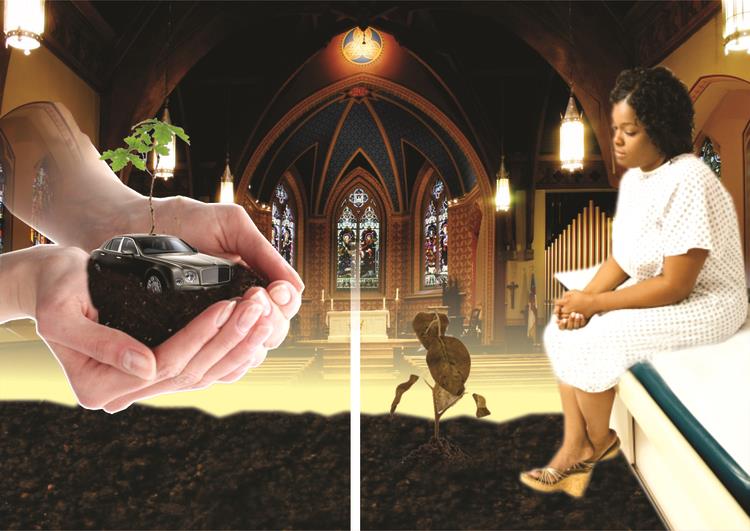
The Sunday Mail

Stories by Desire Ncube
The phrase “sowing seeds” in churches is being used more often, especially among prosperity gospel ministries.
When the phrase is used, it refers to one giving money to the ministry anticipating a 100-fold return.
Some people view the practice as a genuine expression of faith. Others are far more sceptical.

Bishop Noah Pashapa says seeding as depicted in the graphic emphasises that just as the biological seed contains life-force in it so it is with our spiritual and moral choices, behaviour and actions which reproduce results and effects that are consistent with them. However disgruntlement arises where one’s seed does not bring the desired results within an expected time
There are two schools of thought behind the practice, which is popular in charismatic, non-traditional styles of worship.The first is that if the minister utters something that resonates with you spiritually, you place money at the altar – tantamount to sowing a seed in the ground – and wait to reap blessings.
The second is that if you are inspired by the minister’s teachings, you need not wait for the offertory to give.
Apostolic Faith Mission in Zimbabwe president Dr Ashper Madziyire says the concept of seeding has Biblical roots.He says the Bible was written to people in predominantly agrarian societies, hence Jesus used parables and teachings that made reference to sowing and reaping.
“In Genesis 26:12 we see the principle being applied to Isaac as he sowed and reaped 100-fold. In Israel they used to express their gratefulness to God for the harvests through the Feast of First Fruits when the offering was brought to God (Exodus 23:19, Leviticus 23:10).
“… the rule is that the more seed you plant, the more fruit you harvest. This applies also to our Biblical giving; 2 Corinthians 9:6 says ‘whosoever sows sparingly will also reap sparingly’.”
Dr Madziyire says the principle of sowing is related to the law of multiplication. In Matthew 13:8, Jesus spoke of a seed that returned 100, 60 and 30-fold.
“One grain of wheat produces a whole head of wheat. In Hosea 8:7 we are told that you can sow the wind and reap a whirlwind. This can also mean that one positive deed can result in a blessing of a lifetime.
“Figuratively speaking, this can imply the necessity to wait, for nothing of value or good can be achieved or happen overnight. The farmer must be patient for him or her to see the fruit.
“In 1 Corinthians 3:6 Paul likens ministry to a seed, watered and reaped, thus suggesting a length of time. God will bring fruit in his time but until then we have to faithfully labour in his field in Matt 9:38,” Dr Madziyire adds.
“Giving in the Bible is sometimes likened to seeding (2 Corinthians 9:6-11). It is a principle of the Word of God, and if followed rightly, it can yield amazing fruits.”He says when farmers plant, they look for appropriate seed for a particular type of soil: “In like manner, your giving should be right and for the right purpose, otherwise no fruits are realised.”
Dr Madzire warns that gimmicks must not be used to coerce people to give, otherwise they will not reap.
“The person who is giving must decide in their heart what they want to give, or must have a prompting from God and not coercion.”
Prophet Healing and Deliverance Ministries leader Prohpet Walter Magaya has addressed the controversial issue of seeding thus: “The sower understands that there are personal rewards and blessings through constant giving. A sower knows the season to sow in order to attract higher yields.
“By constant seeding you create a vacuum of receiving thereby extending the limits of your receiving. Know what to seed, the season and the proper soil to seed. By changing your limit of seeding you change your level of receiving.”
But Methodist Church in Zimbabwe education secretary Reverend Elliot Mashonganyika says there may be no greater perversion in modern charismatic movements than that surrounding money and seeding.
“God’s love, favour and blessings to us are based solely on God’s attributes of kindness and grace towards us and not on the works we perform. God’s blessings cannot be bought or sold,” he asserts.
Rev Mashonganyika says the Methodist Church’s Standing Orders are silent on seeding, prompting some ministers to practice it – but in the form of church fundraising and for the minister’s personal use.
In “The Agony of Deceit”, Joel Nederhood writes that “whenever a religious leader or a church comes up with a scheme that confuses salvation with some kind of monetary payment, you have the worst kind of dishonesty”.
He continues: “That is like trying to sell something that is not yours to sell. It is like trying to sell something again that has already been sold and paid for. It is a scam. It’s trickery. It’s self-serving thievery.”
Rev Mashonganyika adds that Paul cautions humanity against the quest for wealth when he writes, “People who want to get rich fall into temptation and a trap and into many foolish and harmful desires that plunge men into ruin and destruction.
“For the love of money is a root of all kinds of evil. Some people, eager for money, have wandered from the faith and pierced themselves with many griefs. But you, man of God, flee from all this, and pursue righteousness, godliness, faith, love, endurance and gentleness.”



